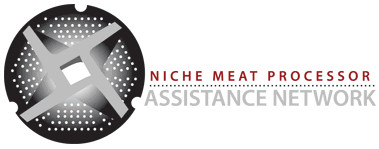The Niche Meat Processor Assistance Network (NMPAN) is a national community of practice focused on the long-term viability of the small and mid-sized processors who are essential to the local and regional meat and poultry sectors. By connecting processors, producers, other supply chain actors, and support entities like agencies, NGOs, universities, and funders, NMPAN creates opportunities for peer exchange, problem solving, and innovative approaches to difficult challenges. NMPAN was founded in 2008 and is housed at Oregon State University. NMPAN is part of eXtension, an initiative of the national land-grant university system, providing objective, research-based, credible information.
 Who is part of NMPAN?
Who is part of NMPAN?
- Meat processors- custom and inspected, slaughter through retail butchers
- Livestock and poultry producers, marketers, and buyers
- Companies that support the meat sector- equipment dealers, supply companies, consultants, insurance brokers, architects and plant designers, and more
- Cooperative Extension and other academia
- State and federal departments of agriculture, food safety, and health
- Non-governmental organizations (of many types)
The NMPAN leadership team is comprised of Director Lauren Gwin, Program Manager Rebecca Thistlethwaite and a twelve-member advisory board drawn from industry, academia, NGOs, and government. NMPAN is a member of the American Association of Meat Processors (AAMP) and several regional and state meat processing associations. We seek to collaborate with other like-minded organizations to strengthen the sector.
“NMPAN has been critical to the National Sustainable Agriculture Coalition’s work on livestock, meat processing, and food safety issues.” – NSAC Senior Strategic Advisor
What Are Niche Meats?
Locally raised, certified organic, grass-fed, no routine use of antibiotics, humane — we use “niche” very broadly to refer to many types of market differentiation. Niche meats are often marketed more directly to consumers with shorter supply chains and more regional distribution. Niche meat processors generally do some co-packing for local farmer/ranchers. Niche meat processors tend to be small or very small in size and work with more non-commodity meat and wild game.
What does NMPAN do?
NMPAN’s strength is our peer-to-peer learning. We are comprised largely of meat processors, producers, consultants, and academics in the niche meat supply chain. Our most valued offering is our listserv of 1,300 individuals that ask questions and provide answers. Our second most popular resource is our website, with hundreds of pages of content on business planning, processing equipment, food safety, regulatory compliance, human resource management, how to find a processor, case studies of successful operators, and more. Our third most popular resources are our bi-monthly webinars and our YouTube videos. Also popular are our monthly newsletter, case studies, and other technical guides that can be found on our website. NMPAN also provides some free and/or subsidized consulting for individual operators that may have a challenge they need help with. Our vision is to see a stable base of profitable and nimble small and mid-sized meat processors that are essential to bringing sustainably- and humanely-raised meat and poultry to local and regional markets.
“When we ran our own processing facility NMPAN was totally completely invaluable in terms of learning the ropes getting questions answered and how we should work with FSIS on how to solve common problems. I think it’s fair to say we could not have opened our own processing plant and been successful without it.” – former meat company CEO
“Too often, very small processors feel like they’re alone out there; like no one else understands or lives our challenges. It’s a rough business to make work…NMPAN matters because it shows that together we do have a voice. It shows us that other people are living the same thing.” –Producer/Processo

Report Abusive Comment